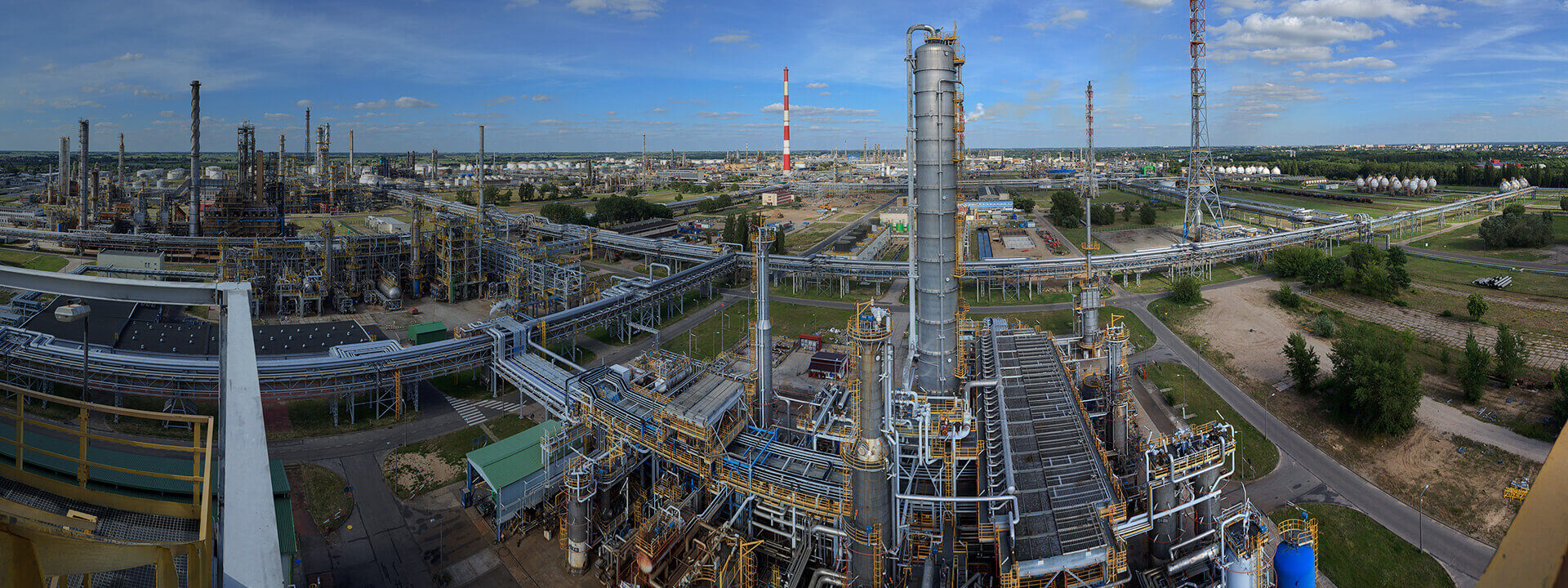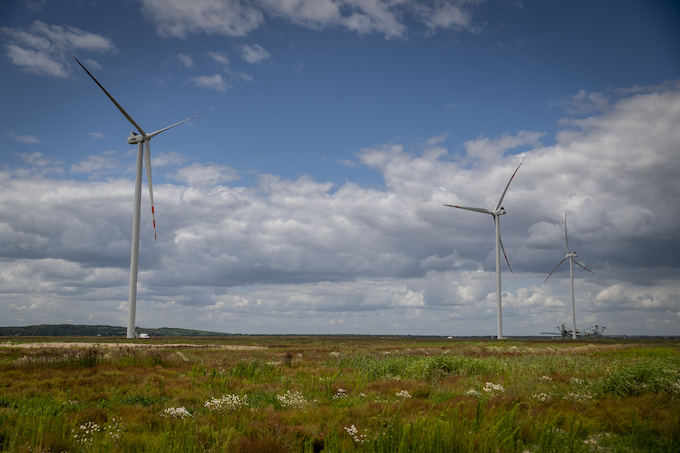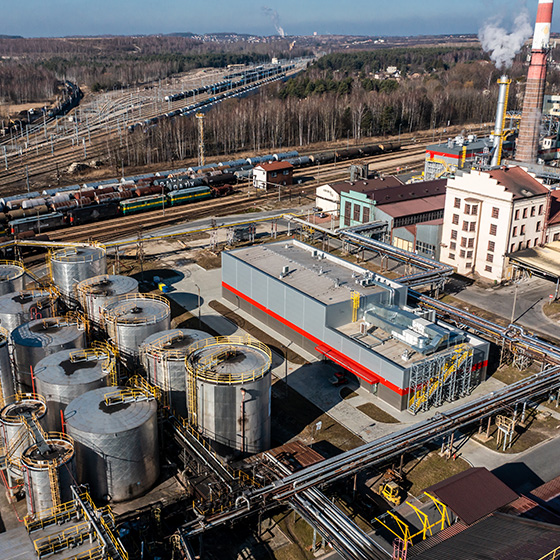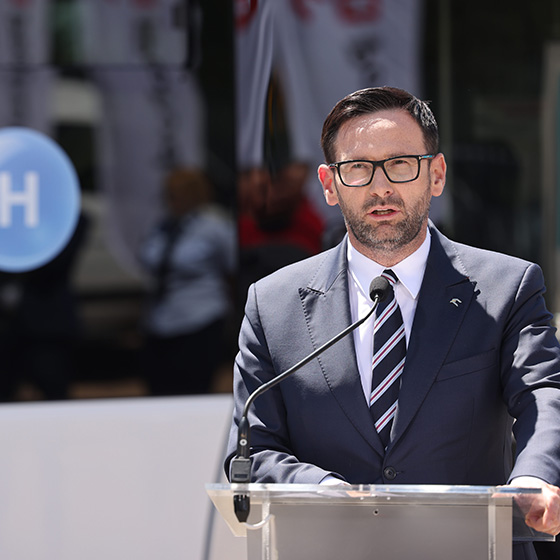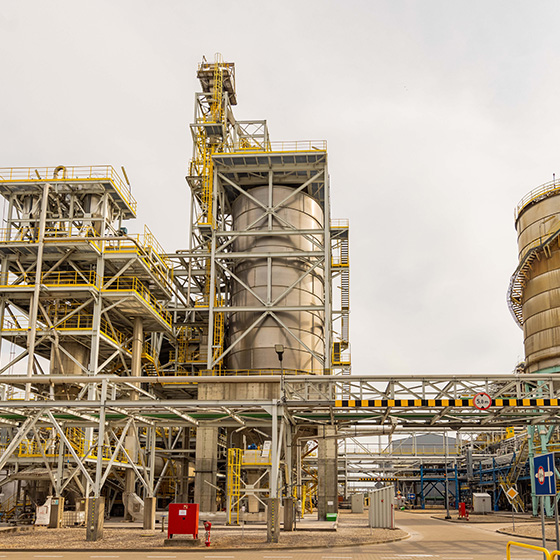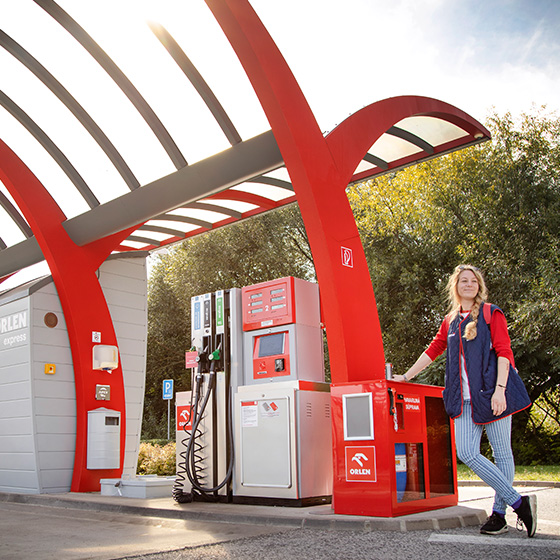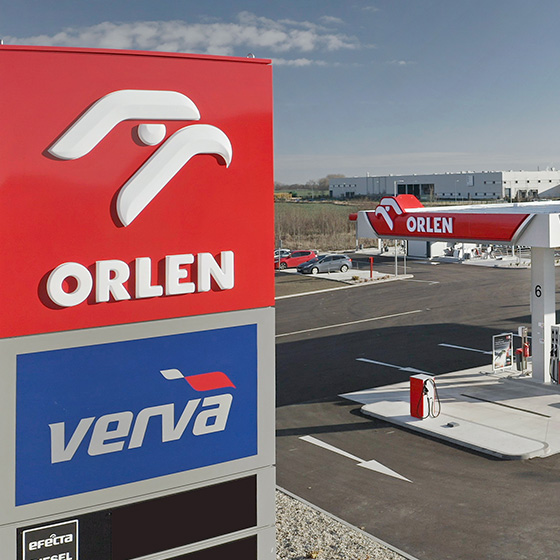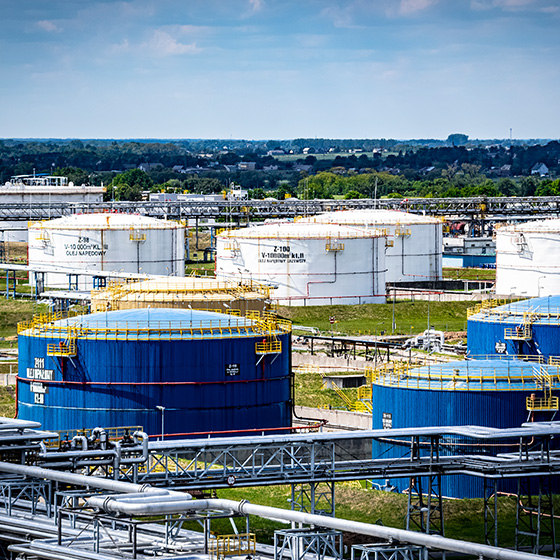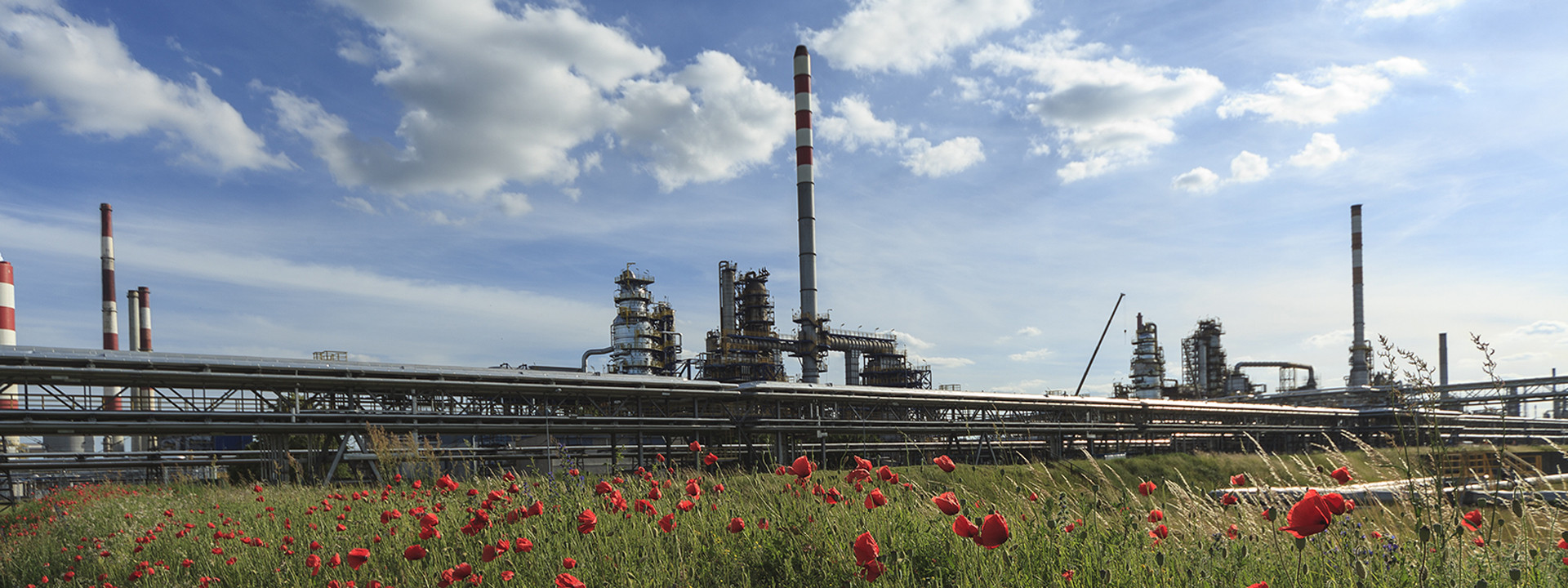About the ORLEN Group
ORLEN Group
ORLEN S.A. (“ORLEN”, the “Parent”, the Company”) was established on September 7th 1999 as a result of the merger of Petrochemia Płock S.A. (“Petrochemia Płock”), a producer of refining and petrochemical products in Poland, and Centrala Produktów Naftowych CPN S.A. (“CPN”), a distributor of motor fuels in Poland. Prior to the merger, Petrochemia Płock and CPN were owned by the Polish State Treasury, Nafta Polska S.A. (“Nafta Polska”) and employees of the merged companies. ORLEN shares were listed on the Warsaw Stock Exchange on November 26th 1999. On April 12th 2000, the Company changed its name from Polski Koncern Naftowy S.A. to Polski Koncern Naftowy ORLEN SA.
In 2023, Polski Koncern Naftowy ORLEN changed its name to ORLEN S.A. The decision of the Ordinary General Meeting taken on 21 June 2023 entered into force on 3 July 2023, at the time of registration of the change in the National Court Register.
In 2022, ORLEN closed its mergers with the PGNiG Group (in November) and with the LOTOS Group (three months earlier), which marked the establishment of Central Europe’s largest energy group ranking among top 150 companies in the world by revenue and serving more than 100 million customers. Over the fourth quarter of 2022, ORLEN was successfully implementing the merger remedies agreed with the European Commission as a condition to its acquisition of LOTOS Group. For example, it finalised a series of transactions with Saudi Aramco, of which an integral part was an agreement on crude oil supplies to the entire combined ORLEN Group, not only in Poland, but across the region. ORLEN, Saudi Aramco and its subsidiary SABIC also signed a memorandum of understanding to cooperate on a potential petrochemical project in Gdańsk. Some of the merger remedies were implemented in the retail segment. The ORLEN Group acquired and began to rebrand 79 fuel stations in Hungary, previously branded as Lukoil. The Group will additionally purchase 103 fuel stations located in Slovakia and Hungary by mid-2024. In the fourth quarter of 2022, the ORLEN Group also launched a process of rebranding and integrating LOTOS service stations into its Polish network.
ORLEN S.A. (“ORLEN”, the “Parent”, the “Company”), together with companies forming the ORLEN Group (the “ORLEN Group”, the “Group”), is one of the largest and most modern multi-utility groups in Central Europe. The Group also has operations in Malta, Sweden, Hungary, Cyprus, Estonia, Switzerland, the United Kingdom, the United Arab Emirates, Libya, Pakistan, the Netherlands, Belgium, Austria, France, Croatia, Ireland, Colombia, Tanzania, Mozambique, Ukraine, Latvia, and China.
The ORLEN Group’s core business consists in electricity generation, distribution and trading, crude oil processing, production of fuels, petrochemicals and chemicals, wholesale and retail sale of the Group’s fuel products, as well as storage, marketing and distribution of gaseous and liquid fuels. The Group operates in the areas of exploration, appraisal, production and import of hydrocarbons.
ORLEN Group companies provide a variety of services: crude oil and fuel storage, transport, maintenance and repair, laboratory, security, design, administrative, courier, press distribution, insurance, financial, and media (newspapers and Internet website) services.
The Group was also engaged in continued projects to harness renewable energy sources, including development of an offshore wind farm. A strategic decision was made to build an offshore installation terminal for offshore wind farms in Poland, the first such installation on Poland’s territorial sea. The terminal will be located in the Port of Świnoujście and will be one of the most advanced facilities of this kind in Europe. The joint venture project between the ORLEN Group and Northland Power will use 76 state-of-the-art 15 MW turbines from Vestas, whose components will be manufactured at the supplier’s new plant in Szczecin. The turbine manufacturing plant, to be manned by a staff of 700, is scheduled for completion in 2024, while the ORLEN Group’s installation terminal at the Port of Świnoujście will commence operations in 2025.
At the end of 2022, the ORLEN Group also completed a project to construct one of Poland’s largest solar PV farms, located near Wielbark (Province of Olsztyn). The 62 MW solar farm will generate clean energy sufficient to power more than 30 thousand households. At the same time, work is under way to build another solar farm, with a capacity of 65 MW, in Przykona (Province of Poznań), with the construction scheduled to start in the middle of 2023.
The Group is also investing in biogas and biomethane production, building Poland’s first green biogas plant to make a real contribution to reducing CO emissions from heavy goods transport. The pilot plant being built in Głąbowo (Province of Olsztyn) will produce over 7 million cubic metres of biomethane annually, which will then be converted into fuel, bioLNG. This volume allows a truck to travel 22 million kilometres. The ORLEN Group is also successful in its upstream oil and gas activities. In December 2022, PGNiG Upstream Norway and LOTOS Exploration & Production Norge were awarded interests in four exploration licences on the Norwegian Continental Shelf. Together with the latest awards, the ORLEN Group now holds 98 licences in Norway.
Despite allocating billions of złoty to new investments, the Group managed to reduce its debt by PLN 14.5bn (y/y), with the ratio of net debt to EBITDA at (-) 0.08x. In view of ORLEN’s successful merger with Grupa LOTOS and PGNiG and stable financial position, the Company was assigned the highest rating ever. Moody’s Investors Service upgraded ORLEN’s rating to A3, while Fitch Ratings upgraded ORLEN’s Long-Term Issuer Default Rating (IDR) by two notches, to BBB+. Given its sound financial footing and steady implementation of business objectives across all areas of operations, on October 3rd 2022 ORLEN paid dividend for 2021 in the amount of PLN 3.5 per share, that is at a level consistent with the Group’s strategy.
We are embarking on the transformation process with a strong asset base
278
revenue
30.9
operating cash flow
64,494
number of employees as at December 31st 2022
46.9
EBITDA LIFO1
19.7
capital expenditure
33.6
net profit
1.5
dividend for 2021
Financial security
(-) 0,08
net debt / EBITDA
BBB +
Fitch rating
2
bonds linked to ESG rating in circulation
A3
Moody's rating
500m
green Eurobonds in circulation
180m
credit facility agreement with the European Investment Bank
Strong asset base
7
in Poland, the Czech Republic and Lithuania, integrated with petrochemical operations
5,1
of installed power generation capacity
Nearly 100
the Group’s operations focus on Central Europe, Norway, Canada and the Middle East
Some 3,100
in Poland, Germany, the Czech Republic, Slovakia, Lithuania and Hungary
191,000
of oil and gas production in Poland, Norway, Canada, Pakistan and Lithuania
0,7
of existing onshore renewable capacity and a portfolio of new assets
1 For definitions of the financial indicators, see Glossary of selected industry and financial terms.
- 11.19.1
Management of material topic: anti-competitive behaviourcompetitive behaviour
- 11.19.2
Total number of legal actions for anti-competitive behaviour, anti-trust, and monopoly practices and their outcomes
Anti-competitive behaviour
Respect for the principles of fair competition is viewed by ORLEN as one of the cornerstones of its business. The Company is committed to operate in compliance with the competition and consumer protection laws in every country where its business is present. In order to ensure that this priority is implemented in practice, and in view of the multiplicity of markets in which the ORLEN Group operates and its market shares, ORLEN has implemented a policy of compliance with the competition law, having the status of a Group-wide standard, compliance with which is the responsibility of employees and individual companies of the ORLEN Group. For the compliance programme to be effective, formal legal coordination mechanisms have been in place at the ORLEN Group to monitor and manage anti-trust risks, covering potential or ongoing judicial and administrative proceedings, as well as a legal review path for activities subject to assessment under the anti-trust regulations and appropriate whistleblowing channels for suspected violations in this area. These procedures are applied with due regard to the principles of unbundling. In addition, ORLEN is enhancing the awareness of anti-trust rules among its staff through a number of soft measures, in particular by providing them with relevant training and information disseminated via internal communication channels.
Tax transparency
- 11.21.1
Management of material topic
It is ORLEN's ambition to set standards for the discharge of obligations relating to public dues and other public obligations under Art. 84 of the Polish Constitution.
ORLEN has prepared a tax strategy, which is consistent with the ORLEN Group’s business strategy until 2030. Implementation of the tax strategy means ensuring that all obligations imposed by tax laws are fulfilled correctly and on time, so that the Company contributes to providing public funds to enable or support important social initiatives. With this in mind, ORLEN has introduced increased standards for the performance of tax obligations.
Tax security is the core value for ORLEN in the performance of the tax function.
ORLEN has internal structures, infrastructure and technological solutions as well as a system of division of powers and responsibilities enabling proper performance of the tax function. It has put in place uniform high-standard rules for the application of tax laws, including procedures for internal communication and approval of decisions on tax matters. A number of internal procedures have been introduced to identify and mitigate tax risks.
The ORLEN's employees who are in charge of particular activities related to the tax function have extensive knowledge of tax matters and appropriate qualifications. In order to ensure proper tax risk management, the Tax Office operating within the Company's internal structures analyses tax consequences of ORLEN's projects and activities and is involved in the process of decision making on planned and executed transactions at the earliest possible stage.
In the case of particularly complex issues or issues with respect to which there are differing rulings of courts or other competent authorities, the Company uses expert opinions and studies prepared by independent experts from reputable tax consultancies.
Internal functional audits are held at the Company to examine correctness of application of tax laws by ORLEN’s organisational units, and the Company's tax settlements are verified in the course of audits performed by independent specialised entities, including statutory auditors.
ORLEN is an active participant of public life. The Company engages in initiatives promoting development and improvement of tax laws in Poland, delivers opinions on proposed legislation, takes part in social consultations in legislative processes, and submits proposals on tax law areas that require regulation.
The Company monitors amendments to the tax laws on an ongoing basis and implements the required changes in the organisation of its business processes and documentation of business transactions resulting from legal regulations and interpretations issued by tax authorities. To ensure and maintain the highest level of tax security, the Company uses dedicated IT solutions supporting multi-level review of not only the economic transactions but also their tax consequences. The tax reporting process is automated and is based on records relevant to each type of tax liabilities. Tax returns and tax information are filed with the tax authorities in an automated manner with the use of IT tools that guarantee full control of the process.
ORLEN fulfils a number of tax obligations in Poland, in particular with respect to the following taxes:
- Corporate income tax (including withholding tax);
- Value added tax;
- Excise tax, fuel charge, emission charge, stocks charge;
- Personal income tax;
- Property tax;
- Retail tax;
- Agricultural tax;
- Forest tax;
- Vehicle tax;
- Tax on transactions under civil law (transfer tax) and stamp duty.
ORLEN has been one of the largest corporate income taxpayers in Poland at least since 2012, that is since individual data of CIT taxpayers has been available to the public on the Ministry of Finance website. For the years 2012–2021, i.e. periods which have already been reported to the tax authorities, the Company paid a total of over PLN 5bn in income tax in Poland.
According to information provided by the Ministry of Finance, ORLEN ranked first among the largest individual corporate income taxpayers for 2021.
The highest standards of due diligence and tax reporting enhance the Company's tax transparency, strengthen its credibility in the market, and build trust with external customers. The Company does not engage in any activities aimed at tax optimisation or tax evasion, nor does it take any actions which may increase the tax risk or expose the state budget or local municipality budgets to the risk of an illegitimate decrease in amounts of public dues. ORLEN does not have any tax arrears, and all of its tax obligations are fulfilled in a timely manner and with due diligence.
- 11.21.3
Financial assistance received from government
- 11.21.4
Approach to tax
- 11.21.5
Tax governance, control, and risk management
- 11.21.6
Stakeholder engagement and management of concerns related to tax
ORLEN is an integrated multi-utility group with operations in Central Europe, Canada and other parts of the world. We provide energy and fuels to more than 100 million Europeans, and our advanced products are available in nearly 100 countries across 6 continents.
In August 2022, the ORLEN Group completed the merger with Grupa LOTOS, followed by another merger with PGNiG in November 2022. The transactions led to the emergence of the largest multi-utility group in Central and Eastern Europe and an organisation ranking among the 150 largest companies globally.
The ORLEN Group is actively establishing itself as a regional leader in energy transition by deploying clean and environmentally friendly technologies and embracing low- and zero-carbon power generation sources. Our activities are guided by our objective to achieve carbon neutrality by 2050.
Sustainability is the driving force behind ORLEN’s strategy. With our integrated approach, we successfully capture opportunities created by the changing environment and create value through socially responsible energy transition.
We recognise our responsibility for the social and economic development of Poland and other countries where we operate as we are aware that the taxes we pay support prosperity and growth. Accordingly, our Tax Strategy embodies a key ORLEN value: responsible approach to the payment of taxes, built on best practices in tax management, transparency and cooperation with governments, combined with proactive management of tax risks and avoidance of unnecessary disputes.
ORLEN S.A. and other ORLEN Group companies (the “ORLEN Group”) have implemented a range of internal processes and procedures to effectively manage fulfilment of our tax obligations, which align with our general tax risk management policy/strategy.
The requirement to report annually on the strategy implementation follows directly from the Corporate Income Tax Act (Art. 27b), and applies to any entity meeting the statutory criteria, including in particular tax groups (regardless of the amount of revenue earned) and taxpayers with revenue in excess of the equivalent of EUR 50m in a tax year. Such entities are required to disclose information on the processes and procedures they employ to manage and ensure proper performance of their obligations under tax laws, on the discharge of tax obligations in Poland, and on the number of tax scheme notifications filed.
In addition, they submit information on related-party transactions (including with non-residents of Poland for tax purposes) whose value exceeds 5% of total assets, and on any restructuring measures planned or undertaken by the taxpayer that may affect the amount of tax liabilities of the taxpayer or its related parties. The required disclosures also include information on tax returns filed in territories or countries that engage in harmful tax competition Compliance with the above requirements fosters transparency of tax settlements and the entities’ approach to taxation.
Another measure required under tax laws and ensuring transparency of taxpayers referred to above is the disclosure of their individual data on the amount of revenue earned, tax costs incurred, income earned (loss incurred), and the amount of tax due.
ORLEN Group companies have adopted an objective, or mission, to set standards for security, balanced growth, and organisation of business management, including with respect to the discharge of obligations relating to public dues and other public obligations resulting from the Polish Constitution. ORLEN, and the ORLEN Group as a whole, intend to ensure correct and timely fulfilment of all their obligations under tax laws, recognising their role in contributing to public funds that are used to support vital social initiatives. ORLEN Group companies prioritise transparency in tax reporting and in contacts with public and local authorities, including tax authorities.
They do not engage in activities aimed at tax optimisation or tax evasion, or any activities that could potentially increase tax risk or expose the state budget or local municipality budgets to the risk of loss of revenue from public dues. Our approach to tax settlements is based on a thorough review of the tax implications of our business activities and avoiding any initiatives that involve tax risk.
The key companies of the ORLEN Group have a number of internal orders and procedures in place to manage the most significant tax risks and thus ensure accuracy of settlements. The risks covered by those procedures are described in the information on tax strategy implementation published by the key ORLEN Group companies. Each of the ORLEN Group companies adjusts the scope of its procedures and internal orders to the nature of its operations.
Furthermore, the ORLEN Group diligently fulfils its obligations under transfer pricing regulations. The consideration in related-party transactions (involving entities related by equity or personal links) is set on an arm's length basis, using an appropriate pricing method. ORLEN Group companies comply with all statutory requirements, including the preparation of transfer pricing documentation, reporting transactions with transfer pricing information, and submitting the Management Boards’ statements on the application of arm’s length pricing in related-party transactions.
The ORLEN Group has implemented an Organisational Standard on Reporting of Tax Risks and Information, which requires the Group companies to promptly notify ORLEN of any identified tax risks and initiated tax inspections or procedures. In addition, before the relevant deadlines for complying with disclosure requirements under tax regulations the ORLEN Tax Office sends communications reminding ORLEN Group companies of the need to analyse and, where required, comply with the above obligations.
The Company has developed a tax risk management strategy/policy that outlines a tax vision and shared values within the context of the tax policy. This tax strategy is further elaborated in various procedures, internal orders, and instructions, which form a framework ensuring proper fulfilment of tax liabilities.
The key ORLEN Group companies have internal structures, infrastructure, technological solutions, and systems of division of powers and responsibilities that enable the effective performance of the tax function. Moreover, leading ORLEN Group companies have established uniform, high-standard rules for the application of tax laws, including procedures for internal communication and approval of decisions on tax matters, and have deployed internal mechanisms to identify and mitigate tax risks. Those measures are implemented taking into account the scale and complexity of each company's operations, their development phase, and other company specific factors. In some companies, tax security may be ensured by other means.
The personnel responsible for tax-related activities in the key companies of the Group possess extensive knowledge of tax matters and appropriate qualifications. Some companies outsource their tax functions to professional third-party providers of accounting and tax services.
In the case of particularly complex issues or issues with respect to which there are differing rulings of courts or other competent authorities, ORLEN Group companies use expert opinions and studies prepared by independent experts from reputable tax consultancies.
Internal functional audits are held at the ORLEN Group to examine correctness of application of tax laws by the companies’ organisational units, and the tax settlements are verified in the course of audits performed by independent specialised entities, including statutory auditors.
ORLEN Group companies monitor amendments to the tax laws on an ongoing basis and implement the required changes in the organisation of its business processes and documentation of business transactions resulting from legal regulations and interpretations issued by tax authorities.
To ensure and maintain the highest level of tax security, the ORLEN Group uses dedicated IT solutions supporting verification of economic transactions and their tax consequences.
The Group does not engage in any activities aimed at tax optimisation or tax evasion, nor does it take any actions which may increase the tax risk or expose the state budget or local municipality budgets to the risk of loss of revenue from public dues. The Company makes an effort to discharge its tax obligations in a timely manner.
In order to improve the security of tax settlements, key ORLEN Group companies regularly provide dedicated training for specific employee groups, addressing significant tax risks.
At the ORLEN Group, the approach to a company’s tax settlements is based on a thorough review of the tax consequences of its business activities and avoiding any initiatives that involve tax risk, in particular any activities that are in conflict with a well-established position of tax authorities and administrative courts
- 11.21.7
Country-by-country reporting
Tax jurisdiction
In the context of this Standard, tax jurisdictions are identified based on the place where an entity is considered as resident for tax purposes. Those entities include permanent establishments and dormant entities.
Primary activities of the organisation
Brief description of the Company's main business/business sector, such as trading, marketing, manufacturing or distribution.
Number of employees, and the basis of calculation of this number
The reported data reflects the headcount expressed in full-time equivalents as at the last day of 2022.
Revenues from third-party sales
Revenues from third parties (entities other than related parties) regardless of their tax jurisdiction. Revenue means revenue as defined for financial reporting purposes.
Revenues from intra-group transactions with other tax jurisdictions
The entity is required to report revenue from intra-group sales between a given jurisdiction and other tax jurisdictions. Intra-group transactions within the same tax jurisdiction are not taken into account for the purposes of this calculation.
Profit/loss before tax
The entity should report profit/loss before tax for a tax jurisdiction, calculated in accordance with the definition used for financial reporting purposes.
Tangible assets
The entity should report the value of tangible assets calculated in accordance with the principles used for financial reporting purposes.
Corporate income tax paid on a cash basis
Income tax includes tax refunds, disputed payments and withholding tax.
Corporate income tax accrued on profit/loss
Income tax accrued on profit/loss includes accrued tax-deductible expenses and current tax expense accrued on taxable profit or loss for the reporting year, and does not include deferred taxes or provisions for uncertain tax positions. The reported amounts should be consistent with the same scope of data reported in the 2022 financial report (income tax expense as disclosed in the statement of profit or loss).
Reasons for the difference between corporate income tax accrued on profit/loss and the tax paid (tax reliefs, preferential tax treatment, exemptions, etc.)
The entity should describe the items that explain the difference, such as tax reliefs, allowances, incentives or any special tax legislation under which the entity benefits from preferential tax treatment.
Presentation of figures
The figures are expressed in the appropriate currency for a given jurisdiction, rounded to the nearest thousand.
ORLEN Group companies' values by key tax jurisdictions
The ORLEN Group's largest companies in key jurisdictions and their business profiles
Poland
Czech Republic
Lithuania
Germany
Norway
Slovakia
Canada
Read also:
Short-cuts:
ORLEN Group 2022 Integrated Report
You can also download the report in PDF format
